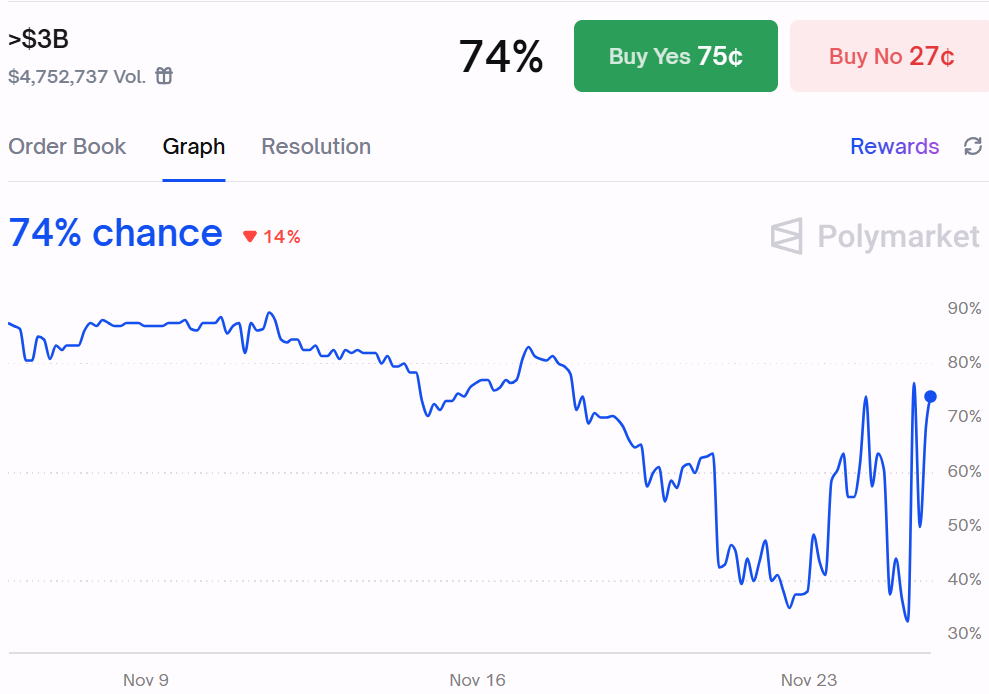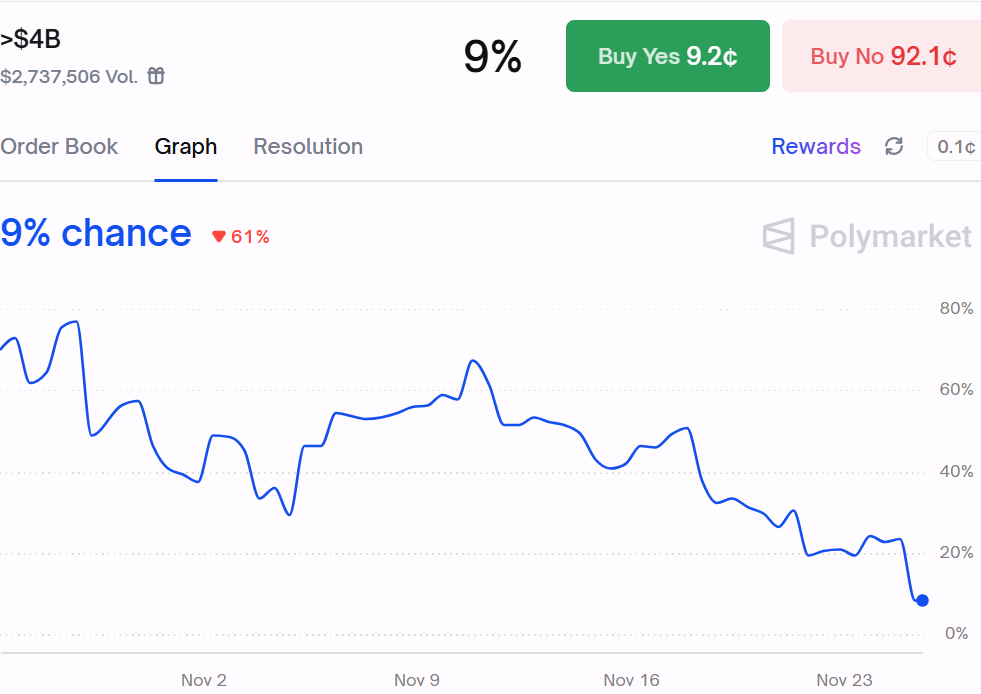Monad’s Debut Shows Why FDV Forecasts Broke as Bitcoin Fell
Monad launched its MON token on Monday with only a small fraction of the total supply in circulation, highlighting a key challenge in crypto valuation: how limited token floats can inflate fully diluted valuations (FDV) that don’t accurately represent true market demand or liquidity.
Monad (MON) went live during one of the year's weakest stretches, with BTC sliding from about $120,000 to below $85,000 in the weeks leading up to the listing.
The market swoon triggered a sharp reversal in Polymarket expectations, as traders treated a multibillion-dollar debut as unlikely. However, many seemed to misunderstand how fully diluted valuation (FDV) works – it's calculated by multiplying the total token supply by the price.
MON's launch is evidence of that, as the token debuted with a $3.2 billion FDV, underscoring how far Polymarket sentiment drifted from the underlying tokenomics. With just over 10.8 billion tokens circulating at launch — or about 10% of the total supply of 100 billion — any price near the sale range was enough to produce a multibillion-dollar valuation.
The market had once entertained the possibility of an $8 billion outcome before flipping deeply bearish, and the debut landed between those extremes.
Monad’s listing underscores a broader tension in this cycle. Low-float launches create valuations that depend more on scarcity than demand, and FDV can become an optical illusion rather than a true signal of market appetite.
When most of a token’s supply remains locked, small moves in price can imply headline valuations that look large but do not reflect deep liquidity.


In MON’s case, the float was thin enough that the FDV outcome was anchored above $3 billion unless the price broke sharply below the sale range. That structure was unchanged even as traders focused on slow sales momentum, a large team allocation, and the risk of airdrop selling.
The BTC backdrop amplified the misread. As the market shifted into risk-off mode, prediction markets appeared to track macro fear rather than the mechanics of the launch.
The collapse in the higher FDV brackets occurred at the exact moment the valuation floor was clearest, suggesting traders were overweighting BTC’s slide and underweighting MON's small float. The result was an expectations curve that no longer aligned with the supply math.
Monad’s debut will likely fuel a renewed debate about what FDV measures in low-float environments. For long-term holders, the potential dilution from locked supply remains a real concern, and the eventual unlock schedule extends through 2026 and beyond.
For short-term traders, the launch shows how FDV forecasts can break when macro volatility and engineered scarcity collide. The listing did not signal overwhelming demand, but rather a valuation anchored by structure.
In a market where token distribution models continue to favor small floats and delayed unlocks, MON’s debut may become a reference point for how easily pricing frameworks can be pulled off course.
When supply mechanics and sentiment move in opposite directions, the market often prices the mood first and the math later. Monad landed in the middle of that gap.
Disclaimer: The content of this article solely reflects the author's opinion and does not represent the platform in any capacity. This article is not intended to serve as a reference for making investment decisions.
You may also like
Japan Equips Crypto Exchanges with Conventional Financial Protections
- Japan's FSA mandates crypto exchanges to hold liability reserves from 2026, aligning with traditional financial safeguards after major exchange collapses. - Reserve requirements will be volume-based and incident-adjusted, allowing insurance to offset costs, ensuring immediate user compensation without bailouts. - The reform reclassifies crypto as financial instruments under strict oversight, including audit enhancements and insider-trading bans, mirroring securities firm standards. - Larger exchanges lik

Private Transactions, No Registration Required: ShopinBit's Crypto Concierge Manages International Orders with Complete Privacy
- ShopinBit launched a privacy-focused web app enabling crypto payments for global services using Bitcoin , Monero, USDT, and 2,000+ altcoins via EXOLIX. - The no-account platform offers 2% cashback for early users and handles high-end logistics with a 10% transparent service fee, emphasizing "Ultra Privacy Mode" with no data storage. - Distinguishing itself from competitors like TrustLinq, ShopinBit prioritizes discreet crypto transactions while managing complex orders through EU-based logistics partners.

"Berachain's Unique Refund Conditions Raise MFN Issues in Cryptocurrency Agreement"
- Berachain co-founder Smokey dismissed a $25M refund clause for Nova Digital as "inaccurate," citing compliance needs for Brevan Howard's Abu Dhabi fund. - The clause allows Nova to reclaim its investment until Feb 2026 if $5M is deposited post-TGE, but activation remains unconfirmed. - Four crypto attorneys called the refund mechanism "highly unusual," raising concerns about potential violations of "Most Favored Nation" investor clauses. - Smokey denied MFN breaches, noting no other Series B investors re

Paxos Purchases Fordefi to Drive a New Era of Secure Institutional Crypto Custody
- Paxos acquires Fordefi for over $100 million to strengthen institutional crypto custody. - The deal integrates Fordefi's MPC wallet tech and DeFi tools into Paxos's regulated infrastructure. - This marks Paxos's second 2025 acquisition, reflecting growing demand for secure digital asset solutions. - Fordefi's $28M prior funding and institutional client base (300+) enhance Paxos's market position. - The move aligns with industry trends as firms prioritize secure, scalable crypto infrastructure amid regula

